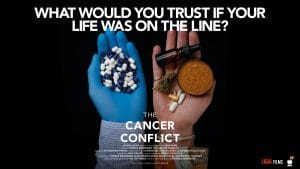
Cancer treatments are constantly improving, but some patients choose to reject mainstream medicine and embrace alternative therapies. How effective are these treatments? And why do people choose them? Five patients – suffering from different forms of cancer and following holistic treatments – agreed to let us refer their cases to an oncologist. Are they taking dangerous risks by choosing a different path?
In 2010, Aija was diagnosed with breast cancer. After having a biopsy on one breast, she turned to a raw food diet. When she started feeling better, she cancelled the second planned biopsy and, since then and against her doctors’ advice, she has refused all treatment. Although not a single scientific study has shown that raw food has any effect on cancer, the internet is awash with miracle stories presenting it as THE cure. But, 14 years on from her radical decision, Aija seems healthy and well. Is this proof the diet works? Not according to oncologist Dr Schlaeppi…
The University of Utah Cancer Treatment Center has carried out the largest study to date following the progress of patients using only alternative therapies. They found that “patients who were using alternative medicines were at a much higher risk of death.” In certain cancers, like breast cancer, those using only alternative therapies were 5.7 times more likely to die than those in conventional treatment. But alternative therapies clearly offer people something lacking in conventional medicine. Is there a way to combine the advantages of both types of treatments?
Through moving testimonies and expert analysis, this film brings personal beliefs and scientific data face to face, exploring the sometimes blurred boundaries between faith, integrative medicine and misinformation. At the heart of this nuanced, profoundly human story lies a universal question: what does ‘healing’ really mean? And how far can we claim the right to choose our own path in the face of disease?

It’s estimated that up to up to 90% of cancer patients look for alternative or complimentary treatments, a decision that doubles the risk of death. But in a world of misinformation, how can patients make an informed choice?
More info